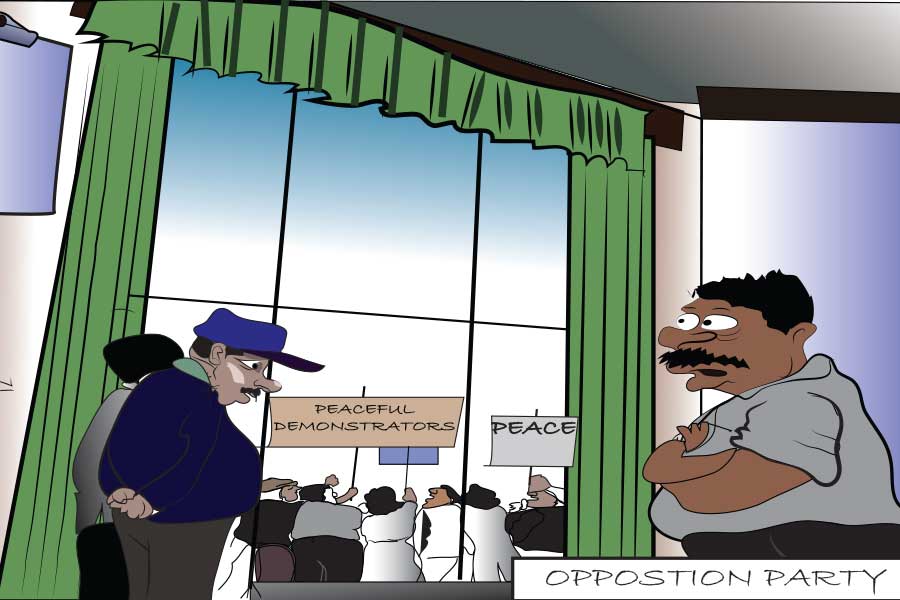
Editorial | Apr 20,2024
Every two, three or four years since the early 1990s, Quentin Tarantino has been making movies that managed to enrich not just cinema but pop culture itself. He has made nine movies since 1992, and his worst, Death Proof, would have been a masterpiece had it belonged in almost any other contemporary director’s filmography.
His latest, Once Upon a Time in Hollywood, is a film that further demonstrates a movie is most mesmerising when made by a person, such as Tarantino, Martin Scorsese or Paul Thomas Anderson, with great reverence for the art form.
This is perhaps why Tarantino’s movies do not say anything grand about the human condition. We do not learn any great mystery about the reality of our universe from watching any one of his movies.
What we glimpse instead is how stupefying and numbingly awesome cinema really is. He is more concerned with the brilliance of the medium - film - itself than representing reality with it. He is less of an artist that wants to make some sociopolitical statements and more of a maestro that tries to immerse us in the audio-visual brilliance of great cinema.
The stories and the characters he creates are so gleefully larger than life, such brilliant cinematic caricatures of reality, we are ultimately convinced that Tarantino is an artist for the sake of art.
It should be evident that he would never take historical episodes, like how Hitler met his demise, and dramatise them as they are. He much prefers to show us how they would have looked had these pieces of history taken place in a movie, as he did with Inglorious Basterds, where Hitler is gunned down in a - where else? - movie theatre.
Once Upon a Time in Hollywood shares an element of Inglorious Basterds in taking an actual occurrence - the Tate Murders - and taking liberties in how they turn out. The film also has similarities to Tarantino’s masterpiece, Pulp Fiction, in having multiple narratives - though chronologically told in the movie - that finally converge.
The film is about TV star Rick Dalton (Leonardo DiCaprio) and his close friend and stunt double Cliff Booth (Brad Pitt). Rick lives next door to Sharon Tate, the real-life actress and victim of the Manson family, who is played here by Margot Robbie, and her husband Roman Polanski, director of masterpieces such as Rosemary’s Baby and Chinatown.
The TV star had tried and failed to break into movie stardom and is experiencing a mid-life crisis. His stunt double, on the other hand, a loner and possible wife-killer, spends his days wandering in isolation. Their next-door neighbour, on the other hand, is an up and coming star that is progressing in her career.
As the duo struggle to find a sense of direction to their lives, and Tate traverses Los Angeles in wonder, a cult by Charles Manson prepares to unleash into late 1960s Hollywood the kind of horror and violence the film industry was churning out. The ending is as unexpected as it is exuberantly distinct from the truth.
As in every Tarantino movie, it is the style and dialogue that add colour to the film. The legendary director employs subtitles, narration, split screen, slow motion, casual conversations, homages and a flashback to tell his story. This movie being the closest thing he has made to Pulp Fiction, it uses multiple narratives not so much to advance the plot but immerse the audience into the lives of its characters and the mystique of 1960s Los Angeles.
The dialogue, as always with a Tarantino movie, is to die for. It is obviously not how real people talk. Regular people do not have a beat when they converse, employ a wide range of vocabulary or utilise perfect grammar. But characters in the universe of Tarantino do.
They are so well-spoken and articulate, it is spellbinding. There is no scene with dialogue similar to the masterful tavern scene in Inglorious Basterds, but that is a high bar, and what he does in this movie with conversations is almost paranormal.
But every great script requires gifted actors to bring it to life, and that is what DiCaprio and Pitt - whose on-screen chemistry is impressive considering their individual star-power - do for this movie. It is hard to say who the better actor was here.
DiCaprio has several standout moments in the film, especially in scenes where he is playing Dalton acting in a movie. He somehow manages to channel the insecurity of the character he is playing while the character himself is playing a villain in a TV movie. How he is able to get in and out of character, without missing a beat, in a long take is masterly and a testament to the complicated process of acting.
However, it may be Pitt’s performance of the mysterious stuntman, Cliff, that is unforgettable. Indeed, it is the more interesting character, but it is hard to believe anyone else could have played him the way Pitt has. He does not have a lot of lines in the movie, so Pitt’s performance is predicated on the cool and calm demeanour he is able to impress on the character.
The final result is a puzzle. We never quite figure out whether or not he is a cold-hearted, deranged wife-killer or a kind and caring person with the weight of the world on his shoulders. Cliff might have very well been the most mysterious character ever committed to film. By the end of the film, it is up to each individual audience’s observations and biases whether or not to root for him.
One of the most striking details about Once Upon a Time, more than Pitt’s character, is the shortage of violence. This is the closest thing Tarantino has made to a children’s movie, or at least that was what I thought until the last several minutes of this almost three-hour-long movie. The ending is glorious, fetishistic and comical. It is one of the most Tarantino of Tarantino endings there has ever been.
The brilliance of this movie is reason enough that Tarantino should keep making movies until the end of time. Unfortunately, soon after the release of this movie, Tarantino stressed that he plans to keep his promise of quitting the industry after his 10th - next - film.
As devastating as this would be, it is not something we did not see coming. After all, while he is the movie director cinema deserved, seeing as how this film is struggling to make an eighth of the amount of money the live-action remake of The Lion King has already made at the box office, we are not the audience a maestro such as him deserves.
PUBLISHED ON
Aug 24,2019 [ VOL
20 , NO
1008]

Editorial | Apr 20,2024

Covid-19 | Apr 17,2020

Viewpoints | Nov 02,2019

Covid-19 | Mar 21,2020

Radar | Nov 05,2022

Life Matters | Sep 19,2020

Covid-19 | May 09,2020

Editorial | Jun 05,2021

Fortune News | Oct 23,2021

Editorial | Sep 28,2019

My Opinion | 131546 Views | Aug 14,2021

My Opinion | 127902 Views | Aug 21,2021

My Opinion | 125878 Views | Sep 10,2021

My Opinion | 123507 Views | Aug 07,2021

Jun 28 , 2025
Meseret Damtie, the assertive auditor general, has never been shy about naming names...

Jun 21 , 2025
A well-worn adage says, “Budget is not destiny, but it is direction.” Examining t...

Jun 14 , 2025
Yet again, the Horn of Africa is bracing for trouble. A region already frayed by wars...

Jun 7 , 2025
Few promises shine brighter in Addis Abeba than the pledge of a roof for every family...

Jun 29 , 2025
Addis Abeba's first rains have coincided with a sweeping rise in private school tuition, prompting the city's education...

Jun 29 , 2025 . By BEZAWIT HULUAGER
Central Bank Governor Mamo Mihretu claimed a bold reconfiguration of monetary policy...

Jun 29 , 2025 . By BEZAWIT HULUAGER
The federal government is betting on a sweeping overhaul of the driver licensing regi...

Jun 29 , 2025 . By NAHOM AYELE
Gadaa Bank has listed 1.2 million shares on the Ethiopian Securities Exchange (ESX),...